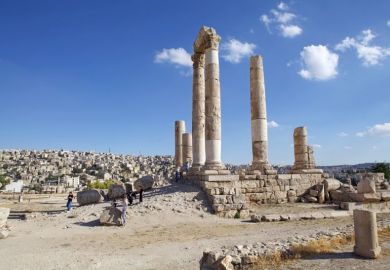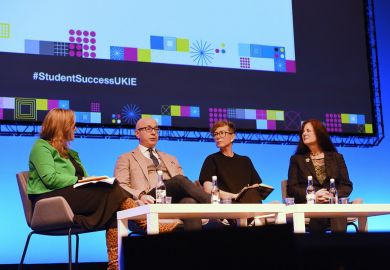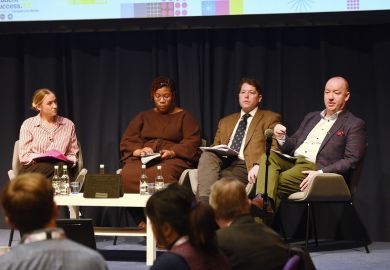“How powerful is place?” will be the dominant question at the Times Higher Education World Academic Summit 2021 on 1-3 September, in response to the growth of digital connectivity and the challenge to traditional geographic boundaries posed by the Covid-19 pandemic. As many universities move towards a more liminal space that embraces a digital and physical presence, university presidents, researchers, political leaders and senior executives of global business will debate and network together to understand the new structures and borders that are emerging to redefine higher education.
Hosted in partnership this year with the University of Toronto, the three-day event will take place online in order to maximise access and enable attendees within all tiers of higher education research, teaching, policy and management to explore how the university’s mission is evolving within the context of blended learning and outreach.
Speakers from across the world will be asked to investigate four core questions: what are universities’ contributions to place? What is the impact of place on universities and how is this acknowledged? How much is digital technology disrupting traditional teaching delivery systems, not just out of necessity for distanced learning but through the application of its potential to erode cultural, economic, and political boundaries? How much does the digital breadth of universities bolster or diminish geographically defined regional and international partnerships?
Phil Baty, THE’s chief knowledge officer, said: “A university’s place in its community, and indeed its very role in society, is facing tremendous uncertainty and change right now. The Covid-19 pandemic has, on the one hand, shown universities at their very best: rallying together with great dynamism and resilience, working with governments, charities, community groups and industry, across national borders, to tackle the global health and economic crisis head on, providing help to mitigate the effects of the crisis, and indeed delivering the powerful solutions to defeat the virus. Universities have stepped up admirably and demonstrated their extraordinary rich and diverse impact, their community spirit and their enormous value to society.
“But on the other hand, the pandemic has raised many questions and challenges. Have universities failed society on access, inclusion and equity, as the pandemic has exposed deep societal divisions? Do they need to play a more pro-active role as society’s conscience and critic, helping to navigate fake news and damaging conspiracy theories to support public health? Where do their community-based bricks-and-mortar campuses fit into a digital world? How do they navigate mounting geopolitical tensions, knowledge protectionism and the race for scientific and technological supremacy? Are they ready to fuel the post-pandemic recovery the world needs?”
The programme, which has been published in its preliminary stages, will first examine the power that universities have to define their location. Mr Baty will be joined by Meric Gertler, president of Toronto, Ronald Daniels, president of Johns Hopkins University, Mamokgethi Phakeng, vice-chancellor of the University of Cape Town, and Louise Richardson, vice-chancellor of the University of Oxford, to debate whether university impact can be more effectively redistributed. Karen Chapple, the incoming director of the School of Cities at Toronto, will lead a debate on whether cities can develop universities that best serve their interests, with insights from Subhasis Chaudhuri, director of the Indian Institute of Technology Bombay, Denise Carvalho, rector of the Federal University of Rio de Janeiro, and Dame Nancy Rothwell, president of the University of Manchester.
Sir Anton Muscatelli, principal of the University of Glasgow – which was highlighted by THE as “University of the Year” in 2020 for its programme on reparative justice in its efforts to redress the institution’s historic links to the transatlantic slave trade – will converse with Sir Hilary Beckles, vice-chancellor of the University of the West Indies, on what universities owe the descendants of slavery.
The summit will also showcase the exclusive live reveal of the influential THE World University Rankings 2022, along with an interactive data masterclass led by THE’s chief data officer, Duncan Ross.
Krishna Rajagopal, dean of digital learning at the Massachusetts Institute of Technology, will analyse whether digital technology is deepening digital divides, and Joseph Wong, vice-president (international) at Toronto, will assess the status of global collaboration at the start of the 2021-22 academic year, as countries battle with discrepancies in the Covid vaccine roll-out. He will be accompanied by Philip Cotton, head of scholarships at the Mastercard Foundation, Gül İnanç, co-director of the Centre for Asia Pacific Refugee Studies at the University of Auckland, and Annelise Riles, associate provost of global affairs at Northwestern University.
“There is a huge amount to absorb and to share at a primarily virtual, remote World Academic Summit with the University of Toronto in September. So, the theme of the summit, ‘The power of place’, initially conceived in the pre-pandemic days, has been tweaked to now ask the question: ‘How powerful is place?’ I think this is an extremely timely and important question to ask of the world’s universities, as they contemplate a future transformed by the global health and economic crisis,” Mr Baty added.
Toronto’s Professor Gertler said: “At this extraordinary moment in time, higher education is busy reinventing itself. How will digitised modes of pedagogy transform the sector? Can remote learning address some of the entrenched inequalities associated with in-person education? Or will it simply introduce other new challenges? What have we lost in the pivot to virtual pedagogy, and what have we gained? And what remains of the attractive power of place, and its ability to convene and nurture creativity? I am looking forward to discussing these questions – and many more – at the virtual World Academic Summit this year.”
Click here to register and find out more about the Times Higher Education World Academic Summit 2021.
Register to continue
Why register?
- Registration is free and only takes a moment
- Once registered, you can read 3 articles a month
- Sign up for our newsletter
Subscribe
Or subscribe for unlimited access to:
- Unlimited access to news, views, insights & reviews
- Digital editions
- Digital access to THE’s university and college rankings analysis
Already registered or a current subscriber?




